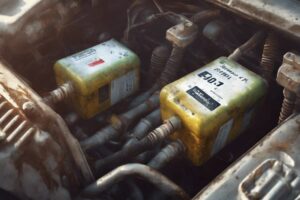Your car’s emission control systems are essential in reducing its environmental impact by managing and minimizing pollutants released into the atmosphere. Oxygen sensors monitor exhaust gases, EGR valves recirculate gases to lower combustion temperature, and catalytic converters convert harmful pollutants. These components work together to improve fuel efficiency, contribute to cleaner engine performance, and meet environmental regulations. Regular maintenance guarantees efficient functionality, supporting cleaner air quality. Diesel Particulate Filters trap harmful soot particles, important for air quality improvement. Evaporative Emission Control prevents fuel vapors from escaping, aiding in compliance with environmental standards. Make sure your car’s systems are maintained for peak performance.
What You Need to Know
- Oxygen sensors optimize fuel combustion for efficiency and lower emissions.
- EGR valves recirculate exhaust gases to reduce harmful nitrogen oxide formation.
- Catalytic converters convert pollutants into less harmful compounds, improving air quality.
- Evaporative emission control systems prevent fuel vapors from escaping into the atmosphere.
- Diesel Particulate Filters (DPFs) trap up to 90% of harmful soot emissions, reducing health risks.
Components of Emission Control Systems

The emission control system‘s components work together to reduce harmful pollutants in a car’s exhaust, enhancing fuel efficiency and engine performance. Oxygen sensors play a crucial role in this process by monitoring oxygen levels in exhaust gases. They provide feedback to adjust the air-fuel mixture for efficient combustion, optimizing fuel efficiency and ensuring the engine performs at its best.
EGR valves are another essential component. They recirculate exhaust gases back into the combustion chamber, lowering the combustion temperature. This action reduces nitrogen oxide emissions, enhancing fuel efficiency and improving engine performance simultaneously.
Air injection systems introduce fresh air into the exhaust stream to facilitate chemical reactions that aid in adjusting the air-fuel mixture for efficient combustion. By ensuring the combustion process is at its best, these systems contribute to both fuel efficiency and engine performance, making your car run cleaner and more effectively.
Function of Catalytic Converters
Catalytic converters play a pivotal role in reducing harmful pollutants in car emissions by utilizing special metals as catalysts. These metal catalysts facilitate chemical reactions that convert toxic substances like carbon monoxide, nitrogen oxides, and hydrocarbons into less harmful compounds such as water vapor, carbon dioxide, and nitrogen gas.
By promoting these reactions, catalytic converters aid in pollution reduction, improving air quality, and lessening the negative impact of vehicle emissions on both human health and the environment. These components are essential in supporting sustainable living practices by meeting strict environmental regulations and minimizing the release of harmful substances into the atmosphere.
Impact of Exhaust Gas Recirculation

Maximize your vehicle’s efficiency and reduce harmful emissions by understanding the impact of Exhaust Gas Recirculation (EGR). EGR valves play an essential role in emission control systems by recirculating exhaust gases to lower combustion temperature and reduce nitrogen oxide (NOx) formation, meeting stringent emission standards.
By reintroducing exhaust gases into the combustion chamber, EGR valves help decrease emissions of harmful pollutants, contributing to a more efficient combustion process and reduced environmental impact. The efficiency of the EGR valve is critical for maintaining emission standards and optimizing engine performance.
Regular EGR valve maintenance is necessary to ensure it functions correctly, as any issues can impact engine performance and emissions negatively. Understanding the significance of EGR valve efficiency is key to reducing harmful emissions and enhancing your vehicle’s environmental friendliness while complying with emission standards.
Importance of Oxygen Sensors
To guarantee proper combustion efficiency and decrease harmful emissions, understanding the importance of oxygen sensors is essential for maintaining your vehicle’s performance and environmental friendliness.
Oxygen sensors utilize advanced sensor technology to monitor oxygen levels in exhaust gases. By providing essential feedback to the engine control unit, these sensors help adjust the air-fuel mixture for efficient combustion, ultimately leading to emission reduction.
The role of oxygen sensors in the emission control system is paramount, as they contribute greatly to lowering emissions of carbon monoxide, nitrogen oxides, and hydrocarbons. Through the continuous monitoring of oxygen levels, these sensors support efficient combustion efficiency, which is crucial for cleaner air quality.
Their ability to enhance the performance of the emission control system emphasizes the importance of oxygen sensors in ensuring that your vehicle operates in an environmentally responsible manner.
How do Emission Control Systems Impact the Performance of Flexible Fuel Vehicles?
When weighing flexible fuel vehicle pros, it’s important to consider how emission control systems impact their performance. These systems help reduce harmful pollutants from the vehicle’s exhaust, ensuring cleaner air quality. While they may slightly reduce engine power, their overall impact is minimal compared to the environmental benefits.
Role of Evaporative Emission Control

Evaporative emission control systems play an essential role in preventing the escape of fuel vapors into the atmosphere. These systems are pivotal for fuel vapor management and have a direct impact on environmental quality. By capturing and storing fuel vapors that would otherwise be released, evaporative emission systems contribute greatly to air quality control. Components like charcoal canisters and purge valves work together to make certain that fuel vapors are contained and processed effectively, reducing air pollution.
Vehicle manufacturers integrate evaporative emission control systems to comply with strict environmental regulations aimed at reducing harmful emissions. Effective management of fuel vapors not only helps in meeting these regulations but also ensures that vehicles play their part in maintaining cleaner air quality.
Therefore, understanding the role of evaporative emission systems is essential for drivers and technicians alike to grasp how these systems contribute to environmental protection and sustainable practices.
Benefits of Diesel Particulate Filters
Diesel particulate filters (DPFs) offer significant benefits by trapping and removing soot particles from diesel engine exhaust. By capturing up to 90% of harmful diesel particulate matter emissions, DPFs play an essential role in improving air quality and reducing health risks associated with diesel exhaust. These filters are carefully designed to meet stringent emission standards and regulations for diesel vehicles, ensuring that they effectively reduce the environmental impact of diesel engines.
Regular maintenance and cleaning of DPFs are essential to guarantee peak performance. The DPF regeneration process, which involves burning off trapped particles, is crucial for maintaining filter efficiency over time. By following manufacturer recommendations for maintenance and ensuring proper regeneration cycles, you can maximize the benefits of DPFs in reducing harmful emissions and protecting both the environment and public health.
Diesel particulate filters stand as a key technology in mitigating the negative effects of diesel exhaust on air quality and human well-being.
As an Amazon Associate we earn from qualifying purchases.










